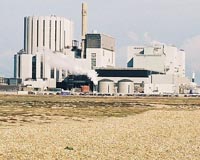 |
Pullman WA (SPX) Aug 17, 2010 A renewed federal effort to fix the nation's stalled nuclear waste program is focusing so much on technological issues that it fails to address the public mistrust hampering storage and disposal efforts. Writing in the latest issue of the journal Science, 16 researchers from around the country say a special White House panel on high-level radioactive waste needs to focus more on the social and political acceptability of its solutions to succeed. "While scientific and technical analyses are essential, they will not and arguably should not carry the day unless they address, substantively and procedurally, the issues that concern the public," they write. The lead author of the "policy forum" paper is Eugene Rosa, a Washington State University professor of sociology and a widely published expert on technological risk and environmental change. Other contributors include fellow WSU sociologist James F. Short and Tom Leschine, director of the University of Washington School of Marine Affairs. Their paper comes while a "nuclear renaissance" has more than 50 reactors under construction and another 100-plus planned over the next decade. Meanwhile, some 60,000 tons of high-level waste have accumulated in the United States alone as 10 presidential administrations have failed to develop a successful waste-disposal program. President Obama is bolstering the nation's commitment to nuclear energy with $8.6 billion in loan guarantees to two new plants in Georgia and a 2011 budget request for tens of billions more. Meanwhile, he has appointed a 15-member Blue Ribbon Panel to review the storage, processing and disposal of nuclear materials. The panel is dominated by science and technology experts and politicians, says Rosa. But disposing of nuclear waste, he says, "will ultimately require public acceptability. Current efforts by the administration, such as the composition of its Blue Ribbon Panel, indicate that this important element may be overlooked." Public mistrust has been fueled by decades of failed attempts to effectively work with those affected, says Leschine. That mistrust, he adds, "is arguably among the chief reasons for the relative lack of progress. Washington State's Hanford Site, the nation's most contaminated, embodies well the twin challenges of technological limitations and both social and political discord." But the psychological and social sciences have learned a lot about how the public has come to view the risks of nuclear waste and can inform policy on selecting stakeholders, discussing the issues and integrating both technical and lay knowledge. "Taking advantage of this knowledge would be a very inexpensive step in developing a publically acceptable solution to the nuclear waste problem," says Rosa.
Share This Article With Planet Earth
Related Links Washington State University Nuclear Power News - Nuclear Science, Nuclear Technology Powering The World in the 21st Century at Energy-Daily.com
 Scientists propose nuclear 'renaissance'
Scientists propose nuclear 'renaissance'London (UPI) Aug 12, 2010 British scientists are calling for a nuclear power "renaissance" in a 20-year master plan proposing global expansion of the industry. Researchers envision nuclear reactors with replaceable parts, portable mini-reactors and even ship-borne reactors supplying countries with clean energy, an article published in the journal Science said Thursday. "With the right investment, these ne ... read more |
|
| The content herein, unless otherwise known to be public domain, are Copyright 1995-2010 - SpaceDaily. AFP and UPI Wire Stories are copyright Agence France-Presse and United Press International. ESA Portal Reports are copyright European Space Agency. All NASA sourced material is public domain. Additional copyrights may apply in whole or part to other bona fide parties. Advertising does not imply endorsement,agreement or approval of any opinions, statements or information provided by SpaceDaily on any Web page published or hosted by SpaceDaily. Privacy Statement |